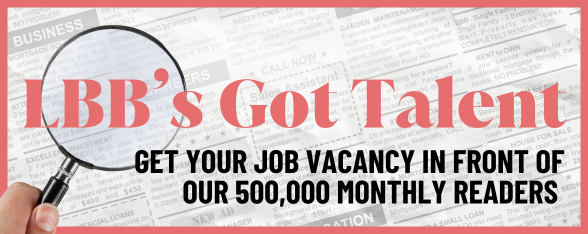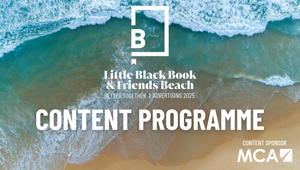
BBDO NY Introduces New Diversity Coalition IDEA

- Above // Left: Isabel Rendon, Right: Naja Bomani
BBDO NY has launched a new diversity coalition, IDEA, to support its commitment to boosting DE&I. Founders and co-chairs Naja Bomani and Isabel Rendon explains how the group came together, their mission and their plans for the future.
Isabel > One of the most positive things to come out of 2020’s many challenges has been a magnified focus on diversity, both inside our industry and out. But, before the spotlight was shown on DE&I, there was a group of individuals from the BBDO NY planning team strategising how they could break silos and build intersectionality from the ground up. When the discussion around race and injustice in our nation got real, our group raised our voices and our hands to advise leadership and share our vision with the agency.
Now, a few short months later, we have a new chief diversity, equity and inclusion officer to lean on and a membership base that has grown to more than 50 passionate advocates for change.
Naja > It all started when a colleague of mine walked up to me and asked: “Naja, how did it feel to be the only black woman on the planning team for a time?” The truth was, with the structure of our team, I never felt like an outsider because the team was so welcoming. However, in the back of my mind I knew that as a young, African American woman, everything I did in the workplace - or in society, for that matter - had to be top notch.
In sharing this with my coworker, he also disclosed feeling the need to represent and increase diversity and cultural awareness at BBDO. He expressed that, just like me, there were not many people within the agency that shared his background. If there were, we had not met them, and didn’t know where to find them. Upon finding commonalities in our experiences, we decided to see if other people in our department felt the same.
Isabel > The thing about being a person of colour is that, the more education and success you attain, the less you find people who look like you and share your experiences. It can be alienating. I majored in advertising. Much of my curriculum was spent discussing social issues and cultural trends, but whenever I looked around, I consistently found that I was the only one from my background in these classes. Once I broke into the industry, I told myself I could not continue achieving success in my career at the cost of sacrificing diverse interactions–an unfortunate choice many BIPOC and members of other marginalised groups constantly have to confront within our lives.
I remember telling Naja, who sat near me, that I needed a diversity resource group at BBDO, and if I couldn’t find it here, then I would have to leave for another place where I could. Fortunately, we took to the route of creating one.
Naja > Our first meeting, of four, was held in an abandoned room tucked behind IT. There, we aired our grievances, bonded over similar experiences, and set our weekly intention of holding space for those who identified with ‘living in the margins’. In addition, we also provided a safe space for those who may not have the opportunity to connect during the ins-and-outs of the hectic workday.
Gathering under the name 'D&Illuminati' we hosted happy hours and encouraged attendees to be magnets, attracting others through word-of-mouth. Out of its organic structure, this grassroots initiative quickly became the community that many BBDOers had been looking for.
Isabel > Soon after, we were hit by the pandemic, followed by the murders of George Floyd and Breonna Taylor, subsequent protests, and the resurgence of the BLM movement. I think a common experience in professional settings for BIPOC who may already feel imposter syndrome, is survivor’s guilt. When you 'make it' so to speak, there's a sense of leaving your community behind. I think the reconciliation comes with accepting that you belong in these spaces and that your purpose is to open the door for others to come after you. With the emotional toll brought by civil unrest, the need to hold space for the communities affected became more important than ever within our agency. People seeking these safe spaces were increasingly added to our group chat, and our numbers multiplied.
Naja > This cultural turning point highlighted the need to focus on DE&I and to create safe spaces for many businesses - across industries - and thus propelling our initiative to the forefront within BBDO NY. Going forward, we became known as IDEA. IDEA (Inclusion, Diversity, Equity & Allyship) encompasses the identity of all of us. It breaks down the idea of diversity being a black and white issue and recognises that everyone has a role to serve as an ally, and that all aspects of our work should be approached through an intersectional lens.
Isabel > When it comes to a movement, there are two critical elements that have to come together. You need knowledge of the history of how and why things have been done a certain way, and an outside perspective that asks, 'but what if we did it a different way?’ I think that's part of what helped give this shape. Naja and I’s approach is the merger of these two critical perspectives.
In the same vein, something that gives IDEA an advantage compared to similar efforts, is its grassroots origins. The combination of C-suite efforts, led by BBDO’s new chief DE&I officer, Jason Rosario, starting from the top-down, and IDEA working from the bottom-up, allows for us to meet in the middle. From there, we’ve built a mutual investment and a shared accountability in making BBDO a diverse, inclusive, and equitable place.
Naja > DE&I is a shared effort. BBDO is invested in elevating the voices of its diverse people, and we’ve been able to break down silos and open lines of communication and allyship through understanding, throughout our organisation. What started out as a meeting of four is now 50+ members strong. Seeing the number of people who are raising their hands to do more is so affirming. What has brought us this far is the support from the IDEA community. We have an advisory council of 16 members who we constantly lean on, who take on additional projects above and beyond their day jobs, and who help push the envelope.
As the co-chairs of IDEA, Isabel and I are excited to see the time and effort that has been put in behind-the-scenes coming to fruition. Our ambition is to use this momentum to build a broader network where we can share resources, collaborate, and influence others, as a positive force for change within the industry.















